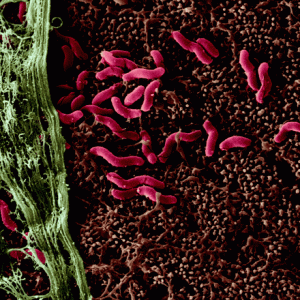Helicobacter Pylori (HP) is a bacterium that infects the human stomach wall mucosa. The bacterium Helicobacter Pylori is responsible for chronic gastritis, duodenal ulcers and plays an important role in certain forms of generation of gastric cancer. Known only in 1980, this infection is contracted in childhood and in most cases it becomes chronic and is accompanied by an inflammation of the stomach lining and cause of 90% of all chronic gastritis.
Transmission is intra-family (parent / child) and infection can take decades, perhaps even life of the infected person. About 10% of infected individuals develop peptic ulcer.
HP lives exclusively in the human stomach and is the only known organism that can survive in an environment so acid. This bacterium has a helical shape (hence the name “H.”) and may be set in the wall of the stomach to colonize. The stomach produces two substances, hydrochloric acid and pepsin. These substances are kept away from the wall of the stomach by mucus.
It occurs if a too high acid secretion or inadequate protection of the mucus. The presence of Helicobacter pylori multiplies by 30 the risk of stomach cancer and it seems that this type of cancer cannot grow in the absence of bacteria.
Typically, bacteria do not stand in the acidic environment of the stomach, while the HP secretes an enzyme that allows it to survive in gastric juice, neutralizing it. Bacteria act in two ways: it increases the secretion of gastric juice and weakens the structure of the gastro duodenal mucosa. Being less protected, stomach or duodenal wall is attacked by gastric juices.
Natural Treatment for Helicobacter Pylori
Essential oils are number one in the fight against Helicobacter Pylori, fighting against both infection and against relapses.
Oils with anti-infective properties are especially essential oils with Phenol, such as oil of Oregano (Origanum compactum) or Thymol, such as Thyme oil (Thymus vulgaris), Tea Tree Oil (Melaleuca alternifolia), Cinnamon Oil (Cinnamomum zeylanicum).
Clove Oil (Eugenia caryophyllata) inhibits the growth of Helicobacter Pylori.
There are essential oils with a significant anti-inflammatory effect, rich in aldehydes, such as the Cinnamon Oil, or as sesquiterpene (used as an antiseptic,antibacterial, or antiinflammatory and as a calming agent by aromatherapists) rich essential oil of Chamomile (Chamomilla recutita) or Ginger Oil (Zingiber officinalis).
Tarragon Oil (Artemisia dranunculus) and Ginger Oil has antispasmodic action.
Several oils such as the Mint (Mentha piperita) Oil and Lemon Grass Oil showed inhibition in vitro proliferation of Helicobacter Pylori.
Phytotherapy has proven to be useful in the treatment of gastro duodenal diseases.
Some isoflavones inhibit the growth of Helicobacter Pylori; the Glycine (Glycine max), Alfalfa (Medicago sativa) and Black Cohosh (Cimifuga racemosa) are some.
Some Brassicaceae like Cabbage or Broccoli contains glucosinolates that are converted by the action of an enzyme in sulforaphane. The molecule inhibits the growth of Helicobacter Pylori bacteria in 8 of 11 cases. The antacid activity of these vegetables disappears after cooking.
Blueberries have anti-infective action and allow better absorption of vitamin B12 in atrophic gastritis. High molecular weight polysaccharides from blueberry inhibit adhesion of Helicobacter Pylori to human gastric mucus.
Chamomile Oil has been shown a decreased of dyspepsia and stomach acidity. To the local anti-inflammatory action is well known and has been compared with that of the proton pump inhibitors. Chamomile essential oil showed inhibition of Helicobacter Pylori in vitro.
Gentian plant contains triterpenes (organic compounds produces by plants) and xanthones (organic compound) that have a direct anti-inflammatory action on the stomach lining, but by xanthones has antistress and antidepressant action, very useful in stomach problems.
Hops plant seem to have a calming effect on the stomach, its mode of action has not yet been elucidated, but it could be an action similar to that plant estrogen.
Probiotics and prebiotics
The combination of prebiotics (non-digestible fiber compounds) and probiotics (live microorganisms which provide benefits for your immune system; nondairy options are fermented food like miso, sauerkraut, microalgae ) many bifidobacteria, Saccharomyces and Lactobacillus been studied and shown clearly better tolerance than the classical triple therapy. These substances seem to have an important role in prevention.
Conclusions
Eradication of Helicobacter Pylori is essential as soon as it was highlighted, in particular, to avoid the risk of stomach cancer. This classic eradication by treatment is not always sufficient. Adding a natural treatment to standard treatment will limit the risk of relapse. Studies have shown that there are many plants that have a net action on Helicobacter Pylori and reduce risks.




You must be logged in to post a comment.